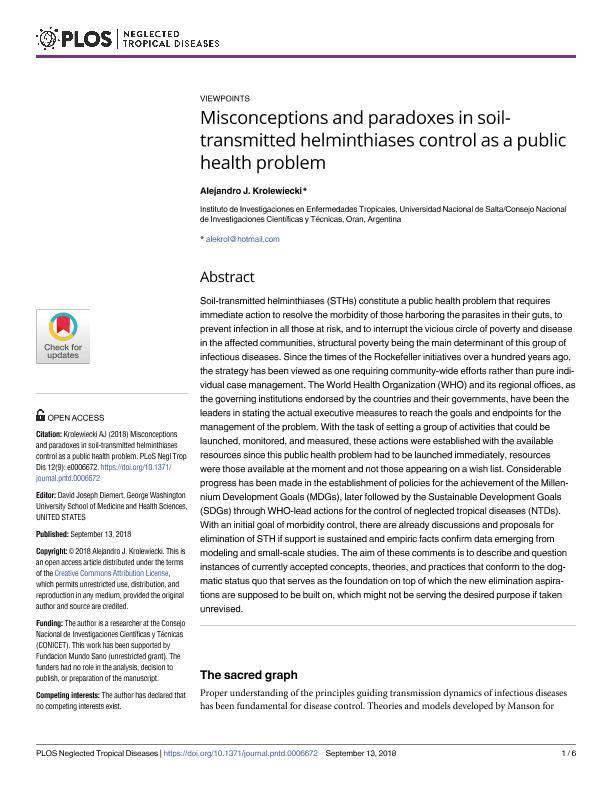Mostrar el registro sencillo del ítem
dc.contributor.author
Krolewiecki, Alejandro Javier

dc.date.available
2019-12-30T15:32:55Z
dc.date.issued
2018-09
dc.identifier.citation
Krolewiecki, Alejandro Javier; Misconceptions and paradoxes in soil-transmitted helminthiases control as a public health problem; Public Library of Science; PLoS Neglected Tropical Diseases; 12; 9; 9-2018; 1-6; e0006672
dc.identifier.issn
1935-2735
dc.identifier.uri
http://hdl.handle.net/11336/93220
dc.description.abstract
Soil-transmitted helminthiases (STHs) constitute a public health problem that requires immediate action to resolve the morbidity of those harboring the parasites in their guts, to prevent infection in all those at risk, and to interrupt the vicious circle of poverty and disease in the affected communities, structural poverty being the main determinant of this group of infectious diseases. Since the times of the Rockefeller initiatives over a hundred years ago, the strategy has been viewed as one requiring community-wide efforts rather than pure individual case management. The World Health Organization (WHO) and its regional offices, as the governing institutions endorsed by the countries and their governments, have been the leaders in stating the actual executive measures to reach the goals and endpoints for the management of the problem. With the task of setting a group of activities that could be launched, monitored, and measured, these actions were established with the available resources since this public health problem had to be launched immediately, resources were those available at the moment and not those appearing on a wish list. Considerable progress has been made in the establishment of policies for the achievement of the Millennium Development Goals (MDGs), later followed by the Sustainable Development Goals (SDGs) through WHO-lead actions for the control of neglected tropical diseases (NTDs). With an initial goal of morbidity control, there are already discussions and proposals for elimination of STH if support is sustained and empiric facts confirm data emerging from modeling and small-scale studies. The aim of these comments is to describe and question instances of currently accepted concepts, theories, and practices that conform to the dogmatic status quo that serves as the foundation on top of which the new elimination aspirations are supposed to be built on, which might not be serving the desired purpose if taken unrevised.
dc.format
application/pdf
dc.language.iso
eng
dc.publisher
Public Library of Science

dc.rights
info:eu-repo/semantics/openAccess
dc.rights.uri
https://creativecommons.org/licenses/by-nc-sa/2.5/ar/
dc.subject
SOIL-TRANSMITTED HELMINTHS
dc.subject
HOOKWORM
dc.subject
NEGLECTED TROPICAL DISEASES
dc.subject
ANTIHELMINTICS
dc.subject.classification
Salud Pública y Medioambiental

dc.subject.classification
Ciencias de la Salud

dc.subject.classification
CIENCIAS MÉDICAS Y DE LA SALUD

dc.title
Misconceptions and paradoxes in soil-transmitted helminthiases control as a public health problem
dc.type
info:eu-repo/semantics/article
dc.type
info:ar-repo/semantics/artículo
dc.type
info:eu-repo/semantics/publishedVersion
dc.date.updated
2019-10-23T21:39:11Z
dc.journal.volume
12
dc.journal.number
9
dc.journal.pagination
1-6; e0006672
dc.journal.pais
Estados Unidos

dc.journal.ciudad
San Francisco
dc.description.fil
Fil: Krolewiecki, Alejandro Javier. Universidad Nacional de Salta. Sede Regional Orán. Instituto de Investigación de Enfermedades Tropicales; Argentina. Consejo Nacional de Investigaciones Científicas y Técnicas. Centro Científico Tecnológico Conicet - Salta. Instituto de Patología Experimental. Universidad Nacional de Salta. Facultad de Ciencias de la Salud. Instituto de Patología Experimental; Argentina
dc.journal.title
PLoS Neglected Tropical Diseases

dc.relation.alternativeid
info:eu-repo/semantics/altIdentifier/url/https://journals.plos.org/plosntds/article?id=10.1371/journal.pntd.0006672
dc.relation.alternativeid
info:eu-repo/semantics/altIdentifier/doi/http://dx.doi.org/10.1371/journal.pntd.0006672
Archivos asociados
